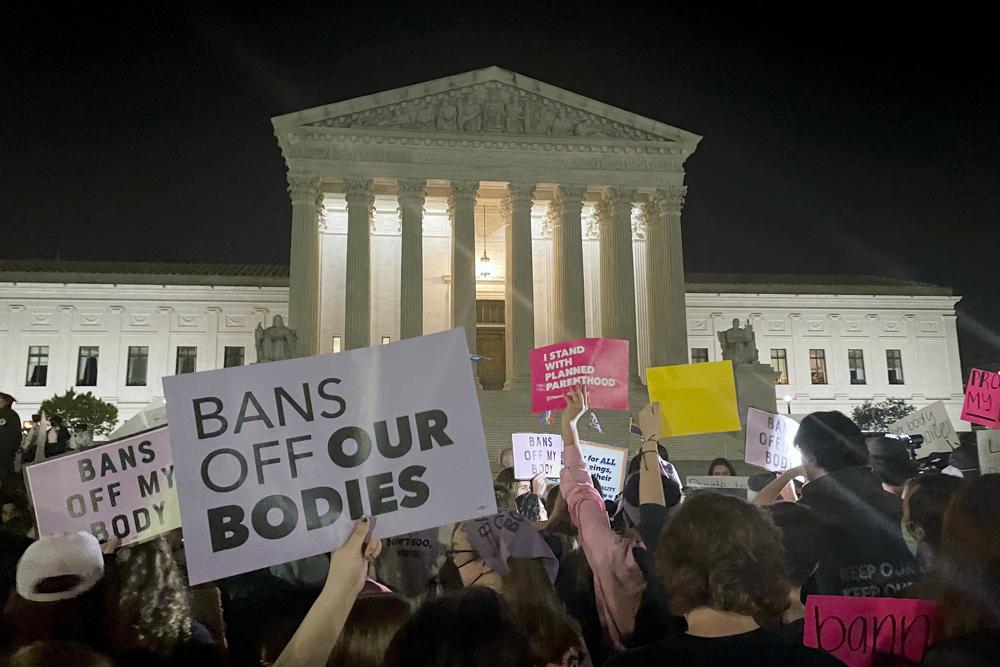Minnesota
Minnesota prepares to be abortion destination if Roe falls, while Wisconsin law dates back to 1849

ST. PAUL, Minn. (AP) — Minnesota could become a destination for abortion services for women from other states if the U.S. Supreme Court throws out the landmark Roe v. Wade decision, and the state’s abortion providers said Tuesday that they’re preparing for the anticipated surge.
That’s because abortion would remain legal, at least for now, under a 1995 Minnesota Supreme Court ruling known as Doe v. Gomez, which effectively established a right to abortion under the state constitution, said Laura Hermer, a professor at the Mitchell Hamline School of Law.
Meanwhile, a Wisconsin law that bans abortions almost outright, dates back to 1849 — a year after Wisconsin became a state.
Minnesota has some significant restrictions in place, including a 24-hour waiting period, a requirement that minors notify both parents before they can get an abortion, and a requirement that only doctors can perform abortions. But a lawsuit by abortion rights advocates that’s due to go to trial next month seeks to remove those barriers. Hermer said it stands a good chance of success.
Minnesota’ abortion providers are concerned about meeting demand from nonresidents. But Sarah Stoesz, president and CEO of Planned Parenthood North Central States, said her organization has been “fortifying” its delivery systems, including telemedicine, in preparation.
“It is important to underscore that an abortion ban is not an abortion ban for all people,” Stoesz said at a news conference. “It is only an abortion ban for those who lack the means to travel to a state where abortion is safe and accessible. And that is one of the true moral outrages of this situation.”
Stoesz’s unit of Planned Parenthood also includes the Dakotas, Iowa and Nebraska. Abortion is expected to become illegal immediately in the Dakotas if Roe v. Wade is overturned. Meeting the demand will pose a staffing challenge in the short term in states where it remains legal because so many health care workers have quit due to the pandemic, she said.
Dr. Sarah Traxler, the group’s medical director, said demand in Minnesota is expected to rise by up to 25%, depending on exactly what the high court rules and what happens in states such as Iowa, Kansas and Nebraska.
Whole Women’s Health of Minnesota recently opened a clinic in Bloomington, near the airport. Around 30% of its patients are already from out of state, some from as far away as Texas, said Sean Mehl, associate director of clinical services.
Democratic Gov. Tim Walz vowed in an email to supporters Tuesday that “no abortion ban will ever become law” as long as he’s governor. His major GOP challengers all support a ban.
“Governor Walz has said he’s going to veto anything we do. The election this fall is crystal clear. A Republican is going to be pro-life and Walz is not,” said Scott Fischbach, executive director of Minnesota Citizens Concerned for Life.
Minnesota governors also appoint judges, Fischbach noted. Five of the seven justices on the Minnesota Supreme Court were appointed by Democratic governors.
Abortion also will be important in certain legislative races. Fischbach said there’s an anti-abortion majority in the GOP-controlled state Senate but that “it’s very tight” in the Democratic-controlled House.
On the House floor Tuesday, two anti-abortion amendments offered during a debate over a health and human services bill very narrowly failed on procedural votes. Too few members were willing to overrule the speaker’s decision that the amendments were out of order.

